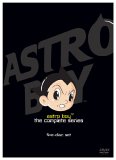| Reviews & Columns |
|
Reviews DVD TV on DVD Blu-ray 4K UHD International DVDs In Theaters Reviews by Studio Video Games Features Collector Series DVDs Easter Egg Database Interviews DVD Talk Radio Feature Articles Columns Anime Talk DVD Savant Horror DVDs The M.O.D. Squad Art House HD Talk Silent DVD
|
DVD Talk Forum |
|
|
| Resources |
|
DVD Price Search Customer Service #'s RCE Info Links |
|
Columns
|
|
|
Astro Boy: The Complete Series (2003)
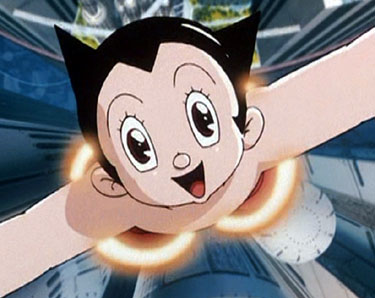
Fear not: Astro Boy hasn't been destroyed. He's been roughed up a little, in the name of American children's programming, but Astro's a tough little bugger. It would be hard to completely mess up a modern remake of the original anime superhero.
In the future, robots are an everyday part of human life, and the machines are slowly evolving. Artificial Intelligence has been born, and society is changing to accommodate this fact. But there are humans who can't stand the thought of robots that can't be controlled. And there are robots that want humanity wiped out. Amid this turmoil, a robot boy named Astro is born. With a mind and body more powerful than any other machine, Astro looks just like a young boy, and his charge is simple: bring harmony to men and robots. With rockets for arms and legs, lasers in his fingers, super hearing, X-ray vision, and immense strength, Astro only strays from his pacifist, naïve ways when someone – anyone – is threatened.
Every day holds a new adventure for Astro, whether he's palling around with schoolmates or journeying to outer space. But every day also holds danger, as human and robot criminals run amok, the citizens of Metro City are always in need of assistance, and Astro's original creator works to realize his mad, frightening dream for his greatest creation.
Little by little over this 50-episode series, we discover a full-out war between humans and robots is unavoidable. Will Astro choose sides, and be the downfall of robots, humans, or both? Or will he be a harbinger of peace in this future world?
I say future, though if you know your Astro Boy, this 2003 series is now taking place in the past, if you go by Osamu Tezuka's (Metropolis, Black Jack) original story. Astro Boy remake take two was made to celebrate the actual manga birthday of Astro, April 7, 2003, and aired in Japan around that time. Americans got to see it on the Kids' WB a bit later (though they only aired 31 of the 50 episodes; how dare they).
Sony co-produced and is the U.S. distributor, so it had a big say in developing the series for American audiences. Death of both robots and humans is never shown in the foreground, the themes don't seem as complex as older episodes, and I guarantee that one fat friend of Astro's wasn't originally named Abercrombie. Also, the Astro hip-shooting machine gun is nowhere to be found. Either they were worried about having Astro armed with anything resembling a real gun, or they were worried it would look too much like he was firing out of his rear end (which is what it looked like in the 1980s show). What, if anything, was cut from the 2003 Japanese version? I have no idea. I don't get Fuji TV where I live.
What I can say is that despite the obvious mission to mold Astro Boy for Cartoon Network's Toonami hour and the Kids' WB, the core story and message that Tezuka meant to relay is kept solidly intact. Tezuka was a pacifist, and Astro has always reflected that to varying degrees. Defense first. Attack only as a last resort. He's caught up in an adventure of good, evil and a ton of gray, yet never drifts from his moral purpose: defend everything that's alive. Even if it means sacrifice. Tezuka's main theme is simple, and it's still here: peace can exist between everyone, no matter how different we are. Maybe all we need is a pint-sized ambassador to get us there.
The design of Astro Boy is very true to Tezuka's style, especially with the characters. Every human is designed with round features, from body to lips to noses to hair. The only characters that have severe, sharp angles are robots (with the exception of a few evil henchmen). Dr. O'Shay, the man who awakens Astro, is nearly identical to the Dr. Elefun of the original, 1960s black-and-white series and the 1980 remake, and Astro doesn't look like he's changed much, other than being a tad leaner, and maybe a bit taller. Large noses and larger eyes are standard. Like so many other things, Astro Boy is credited with causing the entire anime industry to use those giant, reflective, glistening eyes. The characters from Harvey Comics are the closest thing resembling Tezuka's creations.
Thankfully, the makers of the 2003 series didn't go gung-ho on the computer graphics, though they did take advantage of it in many of these episodes. The standard animation is of course better than the previous versions, though it won't impress everyone.
So how much has changed since 1963 and 1980? I can't tell you with complete accuracy, because only incomplete VHS volumes are floating around out there, and neither of the first two versions has been released on DVD here in the U.S. But some obvious differences exist:
1963: The black and white show was called Tetsuwan Atom and Astro is the first robot to be created with a soul and feelings. His creator, Dr. Boyton, has sacrificed much to bring this creation to life, too much when he finds out his son has been killed in a car accident. The doctor makes Astro in the image of his dead son. Astro lives with a family. He attends school, embarks on new adventures, and protects mankind from a new threat: a long-lost brother named Atlas, who hates humans.
1980: Now it's Shin Tetsuwan Atom, and the story has been pared down from 193 episodes to 52. Dr. Boyton is now Dr. Tenma, Dr. Elefun is now Dr. O'Shay, and instead of Tenma being a sympathetic dad who was hardly around, he's a villain. Atlas looks similar to Astro, but they're not introduced as brothers. Astro lives with robot parents and a robot sister. Astro's school life plays a big part.
2003: 50 episodes of Astro Boy now, and much of the 1980s characters are similar: Tenma is badder than ever, O'Shay is a mix between the smart and sloppy characters presented previously, and Atlas looks nothing like the 1980s version. The school subplot is all but abandoned, and life turns into one large rescue mission for Astro.
The new show isn't perfect. While we get an excellent, ongoing story about Tenma and his goal to bring robots to supremacy, some of the standalone episodes are too playful and childish to keep the Astro Boy hardcores satisfied. The DVD isn't perfect either, with episodes presented out of order and a less-than-perfect picture.
But the 2003 Astro Boy is packed full of action, moral lessons, and a well-developed Astro, a unique robot who many fans will be glad to see on their TVs again. Best of all, it stays close enough to the Astro of old to keep a range of animation fans interested.
There's a ton of grain present in this series, mostly in earlier episodes, lots of spots, several of the episodes feature some serious shimmering of the images, and the colors just aren't that impressive. This is a soft-looking animation overall, and looks more dated than a 2003 project should be. The opening animation looks sharper, more detailed and slicker than the series itself. The blacks are pretty solid and deep, though often the colors come across muted and fuzzy. A couple minor animation snafus can be spotted – a finger disappearing here, a robot fading there – but the quality isn't always shabby. Character movements are fluid, and the action is ever-present and a lot of fun to watch.
Careful observers will also note that the image appears to be cut off a bit on the sides in the fullscreen presentation.
The simple 2.0 English option has a ton of music associated with it, mostly simple dramatic choruses of soft keyboard and fast-paced electronica. Explosions are everywhere in this series, but they're not very loud. There are only a few minor audio problems, mostly with drop-outs in a couple of episodes on the fourth disc.
There are Spanish and Portuguese language options, however they come without any subtitles, a serious bummer if anyone wants to watch this with non-English speakers in the room. The big disappointment here is that Sony didn't include the Japanese language option. It's likely the English dub is more subdued than what the Japanese had in mind, because that's usually the case with every anime dub. This is released as a show for the kids, not for the anime buffs. The English dub voices often don't match the character lip movements, at all, making for annoying open mouths with no noise coming out at a few points.
Sony could have appealed to a larger crowd with these DVDs if they had bothered to include the Japanese language option. It's a Japanese-made story, animated by a Japanese studio, and it would have been nice to have it delivered in the original language.
Pretty thin on the extras front here, with previews and a making of Astro Boy featurette. The featurette, "Remaking of Astro Boy," is entertaining at several parts. The American animation expert brought in to the Japanese studio has trouble understanding why Astro Boy is so dramatic and sad. It wouldn't be Astro Boy - or anime - without those elements, the Japanese try to explain. An animator shows us how to draw Astro. And Osamu Tezuka's son shares his thoughts about the series. But this bit is only eight minutes long, and not nearly worthy enough to compliment this show or the Astro Boy world in general. Previews of eight animated shows – including Steamboy and Metropolis - are included.
The series comes packaged in a slick black box with five DVD slim cases. Each case features episode descriptions.
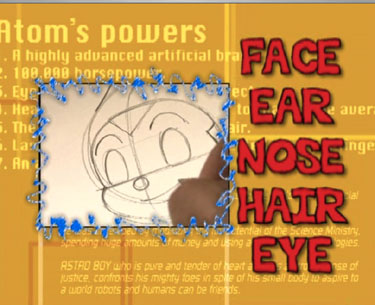
There are 50 episodes of remade nostalgia here, running at a total time of 1,010 minutes, for a retail price of $50, or $1 an episode. Astro Boy is weeks of entertainment that's sure to bring back fond memories for a lot of the older anime fans, and will keep the younger viewers enthralled. The 16-29 crowd may become bored with many of the standalone episodes, but the excellent story arc of Tenma, Astro and the future of robots and mankind makes up for it.
American anime fans must still hold out hope, however, that Manga will release the 1980s Astro Boy remake on DVD some time this decade, and that Right Stuf will take on the challenge of releasing on DVD the 1963, 193-episode original monster series that started the anime movement. For now, even with all its flaws, the 2003 Astro Boy is Recommended.
Below you will find a blow-by-blow of this entire collection, hopefully with only a few, unintentional spoilers.
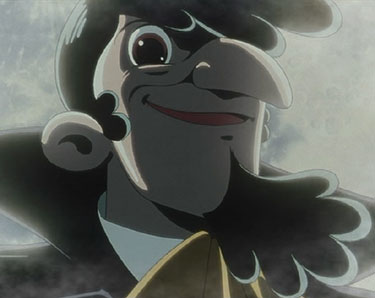
Astro is reborn, as Dr. O'Shay draws all of Metro City's power to give this pint-sized robot boy immense strength and incredible abilities. But the power drain – and a currently mysterious villain named Tenma - has caused the city's massive, mechanical robot controller to malfunction. Within 24 hours of being born, Astro is forced to defend the city from this giant menace. The robot controller is a octopus-like thing that immediately begins attacking the city's residents, which is a little silly. It seems the creators wanted to start the action as soon as possible, because Astro comes out of the gate as a bona fide hero. More time could have been spent showing Astro gain his intelligence and learn about his abilities. But hey, it's a children's series. Astro Boy instead fleshes this all out as we go along.
We soon learn that Astro was created by the unstable Dr. Tenma, who destroyed all his other creations after making Astro. Tenma constantly refers to Astro as Tovio, and believes Astro and robots like him are the future, and that humans are on their way to extinction. O'Shay may not have created Astro, but he's imbued the robot with self-learning artificial intelligence and the personality of a young boy. Astro looks at the world around him with constant wonder and a never-ending stream of questions.
Tenma begins to challenge the limits of his invention, while O'Shay wonders how Astro keeps finding himself in trouble. Astro is forced to defend the spectators of a robot Rocket Ball game, when the robot players threaten the crowd.
Another robot boy, Atlas, is introduced in the third episode, and he's a simple thug, riding with a hovercraft biker gang, terrorizing the citizens of Metro City. He has the ability to morph into a powerful fighting robot, after the evil Tenma gives him an upgrade. Once again, Tenma is testing Astro, and at the same time creating a sentiment among the humans that robots are a threat. Kids begin throwing tomatoes at Astro and other robots. An anti-robot cop believes robots with free will are dangerous and untrustworthy. If he had his way, Astro and other unregulated robots would be dismantled.
The inevitable showdown between Atlas and Astro sees them talk about their creators, the humans, and whether or not mankind is a friend to robots. "The problem isn't with the robots, it's just that humans are afraid," Dr. O'Shay later says. The bigotry humans display for robots that don't act as their slaves is evident early on in Astro Boy, and becomes a regular thing as the series progresses.
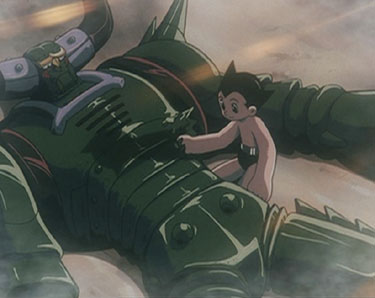
By the midway point of volume one, Astro learns about his past, about how Tenma made him with his son in mind, and that O'Shay reawakened Astro after Tenma lost his sanity and destroyed every creation of his but Astro. Astro's second life comes with no memories of his past. Astro – and the audience – are left to wonder why Tenma deactivated his greatest creation.
But also by the midway point of volume one, Astro Boy begins to suffer some common sense problems. Astro stows away on a space ship when Dr. O'Shay is called away to investigate strange robot behavior on one of the moons of Mars. O'Shay chastises Astro for sneaking on to the ship, saying "It's too dangerous." Listen, old man, Astro has been saving your butt since day one, and is obviously going to save your butt again. He's nearly indestructible, has rockets for arms and legs, can breath in space, and can destroy things much bigger than him. Pipe down. Once we drift from the story about Astro and Tenma, the show becomes a little nonsensical. An overzealous security agent repeatedly and irrationally vows to "destroy all the robots!" A new alien character delivers a crop circle-like message on the moon's surface, telling Astro that he will lead robots in a mission to live together with humans. How the hell did she know?
The story of Tenma and Astro is intriguing, and a little dark in an enjoyable way. The action overall isn't too exciting, but the feeling of a coming conflict between robots and humans keeps the older viewers intrigued. It's sometimes upsetting when the tale is interrupted by quick side stories of trapped aliens and a threatened village. New villains are introduced – Skunk, a robber who uses robots for his dirty work; Cotari, an angry young villager convinced robots are evil; Kato, a psychotic artist – and a few get more screen time later in the series.
At the end of this first volume, Astro travels to the ocean deep, and finds a robot civilization whose members run on liquid nitrogen. When they come on land, on orders from their creator, Astro has to prevent them from starting a new ice age with their weaponry. Little does he know, Dr. Tenma is behind it all. The madman wants to take care of mankind in one fell swoop.

Of all the villains introduced in Astro Boy, Skunk is the one with the most personality, at least up to this point. With a constant smirk and a 1920s "Hey copper" voice and attitude, Skunk laughs at all the attempts to stop him and his robots from taking what they want. That is until he's captured to open the second DVD of this series. The cops finally catch up with the thief, and they lock him away on a supposedly robot-proof island. But a couple of Skunk's flunkies awaken an older robot that's been deactivated (and is unaffected by the prison's technology), and use it to break their boss out.
When the robot is sent to destroy the city – with a girl trapped inside – Astro is presented with that awful choice: nab the crook, or save the girl. What do you think he'll do?
To combat the growing robot threat, the police force of Metro City creates the Anti-Robot Robot Squad, a set of fierce-looking tin men with a lot of firepower. Despite rebuffing his offer to assist, Astro follows the ARRS into battle against a set of three mechanical robot hunters, programmed by Skunk. Unknown to Astro, he's the next target of the trio. The leader of the ARRS of course is going to need Astro's help, as the robot hunters question their programming during their attacks. Conflicted robots? It wouldn't be the first time.
And then suddenly a younger, female Astro is thrown into the mix. The episodes of Astro Boy are obviously out of order on these DVDs, as the episode where Astro's sister Zoran is created is shown on disc three. If you're watching this in order (why wouldn't you?), you'll be scratching your head during a couple of these earlier episodes, as Zoran just pops up out of nowhere.
Later, the ARRS leader falls to the giant robot Pluto, "the most advanced robot ever built, who'll send all the other robots to the scrap heap." He takes on the top Rocket Ball player, a robot that can control the weather, and a gladiator robot. He's marking off a short list of robots he needs to defeat to be the top dog. And guess who's at the bottom of that list. Who's programming this robot? Skunk? Tenma? Someone new? When Pluto takes on Astro shortly after defeating another robot, the giant robot becomes injured. And Astro, true to form, helps Pluto recover, instead of destroying him.
Pluto is like Astro, a robot with the ability to learn, and he uses that to discover his opponents' weaknesses. And we learn that Pluto was built to force Astro to evolve. You see, Pluto is a robot built by robots, never a good sign in any science fiction story. It will take Zoran's help to fix the mess Astro's in, when Dr. O'Shay is kidnapped by Pluto's creator, and the citizens of Metro City watch "the robot battle of the century" live on TV when round three of Pluto vs. Astro goes down.
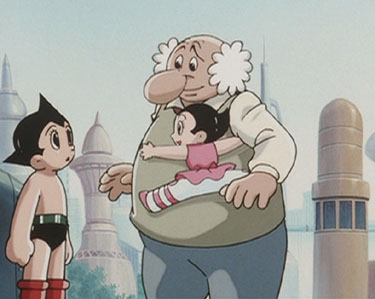
This two-episode story is good, the best at this point in Astro Boy, even with Zoran thrown in with no previous explanation. The battles are very eye-catching and the Tenma story arc is carried a lot further. There are benefits to building a robot with emotion, we learn. But there are drawbacks as well.
After a somewhat comical episode where Astro meets up with an accident-prone explorer named Gulliver, and takes on a not-so-bright trio of pretty and sadistic women, Astro is damaged (hurt?) when he keeps a high-powered satellite from crashing into Earth. A discredited scientist, now a parts scavenger, finds Astro, and just so happens to be the inventor of a device that fixes any robot problem. Go figure. Astro has lost his memory and a second, larger satellite is headed toward Earth.
Episode 17 is a fanciful, pretty part of Astro Boy with Dr. O'Shay and Astro Boy touring a city built completely underground. When the existence of the city begins to threaten the surrounding forest, the roots of the trees begin attacking the city and the residents. Lots of creepy action is included in this episode, as the roots attack everything in sight and Astro takes a beating, but keeps on ticking. The pro-environment lesson is by no means inferred, as metal, artificial robots destroy the roots, and Astro spouts "The tree is trying to tell us something" when they find an old oak isn't attacking the city. "The balance between the trees and the forest has been thrown out of balance! Stop killing the forest!" I kept expecting Astro to reveal a Sierra Club sticker on his power cell. Heck, he even saves a cute little bunny from being roasted by the big, bad robots. What a softy. This episode has some of the most obvious bits of CG used thus far, with the cellular make-up of the tree highlighted.
In the following story Astro is framed as part of a conspiracy to increase human distrust in robots. A group of anti-robot humans attacks their own kind, making up a robot liberation group to take the blame. "The Robot Liberation Army doesn't exist!" Astro protests, shortly after being thrown in jail by our old friends the ARRS. A vigilante robot named the Blue Knight may be the only one who can help Astro and the humans being threatened by a black hole device. And despite his help, the Knight may not be as friendly to mankind as we think.
The Knight returns in episode 19, and this time it's the robots that are in trouble. A pair of computer thieves have their scam go wrong aboard a robot-run space station. The men end up setting off the self-destruct for the station and it's up to Astro and the Knight to save the robots. "I can't let them all be destroyed," Astro yells at Dr. O'Shay when he hears of the tragedy. "It's just not right." Yeah, we knew you'd say that kid.
This is a CG-heavy episode, with the space station and computer spots being the most prominent. Visually, it's better than most episodes of Astro Boy, though the robot-human relationship lessons are slightly predictable by now: The Knight tells Astro he must choose sides. "I choose both," Astro replies with conviction.
From space, to deep underground, Astro hooks up with an expedition traveling to the center of the Earth in episode 20. Why? Who cares. He's changing the hearts and minds of previously anti-robot humans, taking on a hoard of funky subterranean insects, and outrunning an eruption of lava, all while trying to save a town of villagers. Take that MegaMan.
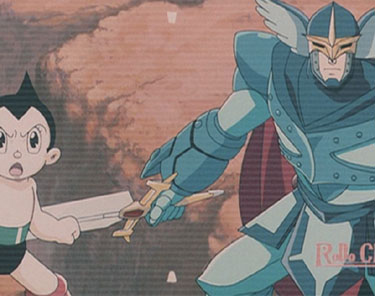
The opening of DVD three finishes the three-episode focus on the Knight, our robot crusader. When he learns robots are being pit against one another in death matches in a traveling gladiator business, he tries to free the robots. At the same time, he debates his place in the robot vs. human drama with his creator, Shadow, and Tenma. We learn of Knight's past, with the former doctor robot-turned-vigilante by the evil Shadow.
Astro and the Knight team up to take down the man running the death matches, but little do they realize, the two heroes are on different sides.
After an episode where Astro learns a robot boy in the circus is actually human, and must help him from being taken away from his robot family, we're finally, formally introduced to Zoran, Astro's annoying, accident-prone sister. When she runs into an anti-robot plot to scare humans with a robot dragon, Astro is forced to save her and Metro City. Being Astro's sister, she quickly becomes a target. An egotistical, anti-robot madman named Mini-Mini – a doctor, of course - infects Zoran with a robo-bug virus. He then convinces Astro that the only way he can save Zoran is by making a shrunk, microscopic Astro to send inside the robot girl. Of course, the doctor has ulterior motives for helping everyone out.
While this episode, No. 24, is fun, with a freaky bug attacking Zoran's brain and threatening Astro, Zoran's character isn't expanded on that much. All we know is that she's weaker than her brother, prone to getting in trouble, and naïve as hell. Astro becomes closer to his sister, but we don't. She becomes a sporadic character in future episodes.
The politics behind the robot vs. human conflict is explored a bit at the mid-point of this series, as we're left with little doubt that the mayor of Metro City, Drake, is a total antirobite. He supports a rally calling for the destruction of all artificial intelligence among robots. The leader of the rally, Cain, can't do what he wants legally, so he has our old friend Skunk help him out with Erasabot, an AI-sucking creator that creates chaos when he destroys the intelligence of all the robots it runs across. Astro is forced to clean up the ensuing mess, and at the same time he befriends Cain's human daughter. That won't do for the leader of an anti-robot movement. By this point, Astro seems to have finally earned the trust of the Metro City police, who help him in his efforts. But when the Erasabot turns out to be more powerful than first thought, everyone – Skunk, Cain, his daughter, Astro – is in trouble. Astro visits the belly of the beast – with some excellent CG mixed with the traditional animation – to try and save the day.
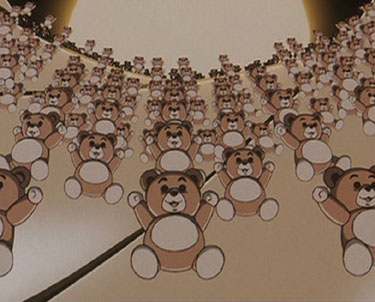
The following episode is a different take on the same theme, with an anti-robot astronaut with a son who loves robots. He loves them so much, he dresses like them and pretends to have robot powers. The astronaut's hatred of machines stems from the fact that she will only be making one more flight into space. Robots have rendered human explorers useless. But when Astro discovers a design flaw in her space ship, he'll be the only one who can save her when things start blowing up.
The set of episodes dealing with robot haters turned sympathizers ends quickly in episode 27, when Dr. Tenma returns, and is challenged by his robot creation Shadow. "I'm still not convinced Astro can lead us," the strange, hooded robot says to Tenma. The plan all along has been to have Astro lead a revolution against humanity, and now Tenma must prove Astro can be made loyal to his cause. This episode is a summary of the series, with Tenma's recalling of Astro's reawakening by Dr. O'Shay (who wants the former robot named Tovio to be the bridge between humans and robots). The flashback focuses on the very brief time we saw Astro attend school. Only a few of the first episodes showed Astro in school uniform and backpack, and the series dropped the school subplot rather quickly, with only a few episodes revolving around the kids at school. They pop up now and then, but are never more than two-line sidekicks.
The flashback goes back through some of the first fights, and all seems in order, until Tenma recalls Astro's battle with mind-controlling teddy bears, which doesn't happen until two episodes later on this DVD. How hard was it for the DVD producers to get the episodes in order?
A fun-loving princess named Abby visiting Metro City is being threatened by the next in line to the throne in episode 28, and one of Astro's friends helps her escape a group of henchmen. Astro discovers the princess' kingdom is torn over the fact robots are playing a prominent part of everyday life, and Abby has come to Astro's city to learn how robots and humans get along. "Every place has some people who hate robots," Astro's friend Reno says when Abby wonders if all people in the city like robots.
The next episode is one of my favorites of the entire series. Shadow concocts a plan to have friendly, robotic fuzzies named microbears take down the Ministry of Science. The little robots befriend everyone in Metro City, one by one, and begin telling people what to do. Even Dr. O'Shay is hypnotized by one of the little, cheerful machines. These things are creepy, and begin falling out of the sky on parachutes. Astro and sister Zoran figure out what's going on, and may be getting some help stopping the madness from an unlikely source. Could this all be another one of Tenma's tests?
In the final episode of this third DVD, Astro hooks up with an anti-robot private investigator ("The only good robot is a no-bot") to solve some locked-safe robberies. Robots are involved, which means our old friend Skunk has got to be behind this. There are a few very cool spots of CG in this episode, with a golden dragon robot flying through the screen and some enjoyable "magnabot" action.
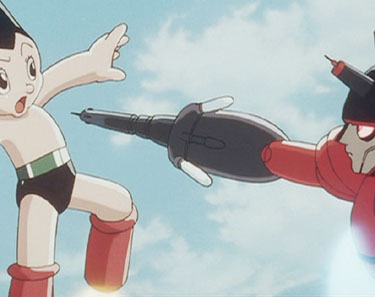
The simple moral lessons for children placed in Astro Boy are most prevalent at the start of the fourth DVD. Expressing jealousy of Astro, Zoran asks Dr. O'Shay for an upgrade, who tells her he can't do anything more. She's unique and shouldn't be changed anyway, the doctor says. Angry, Zoran joins with our PI from episode 30 to solve the latest mystery: a black hole machine from a previous episode combines with a toxic waste used in a previous episode to destroy robots and cause the very fabric of existence to be torn apart. The PI softens his anti-robot stance by being around the sympathetic Zoran, and Astro and Zoran must come to terms with the fact that, siblings or not, they're different.
Episode 32 sees Astro and Zoran go on a deep sea exploration with a dolphin robot named Gideon. Gideon has some confidence issues, and he'll have to get over that quickly when the exploration team gets into trouble. Courage, kids, courage. Following that is an episode looking at Astro and friend's new buddy, a spoiled rich girl, who complains that dad buys her everything for her birthday, but is never around to play with her. It doesn't mean he doesn't love you, dear, it's just that dad's busy. And dad, the Beatles had it right: money can't buy love. During all this exploration of the soul and emotional growth, our old evil Dr. Mini-Mini comes back into the picture. And he's got a way to make nightmares come true.
A shape-shifting animal is the apparent culprit in the theft of a piece of lumanite, a mysterious element found only on the moon. This shape-shifting creature is being controlled by a new villain, a suave and stuck-up rich boy named Rock. This is the start of a two-episode story arc, which pits Rock's wits against Astro's might, with a little alien backdrop thrown into the mix.
Episode 36 is mostly a fun, throwaway story, where Astro joins a group of kids at a space camp, and ends up playing match-maker for a couple of the kids. Of course, Astro will be forced to help rescue someone at some point. It wouldn't be an Astro Boy episode without someone in distress.
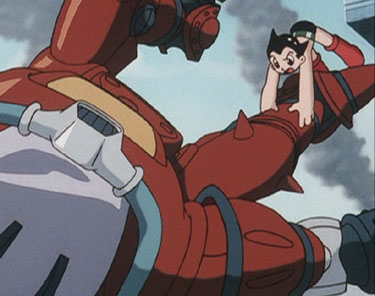
When Astro's old nemesis Atlas shows up again, Dr. O'Shay's past comes back to haunt him. Pavlos, a scientist that wanted O'Shay's job, is helping an anti-robot group develop technology that makes robots with free will turn into mindless machines. Astro must find a way to destroy the chip controlling Atlas, but it doesn't look like our boy is a match for Atlas. Unlikely assistance comes from Tenma. He's not about to let one of his former underlings destroy his greatest creation.
A group of anti-robot space raiders takes control of a robot encampment in the next episode, and Astro and the Blue Knight reluctantly agree to work together to save the robots. The robot "daughter" of two of the captives' struggles with a tough decision: become a battle robot, and lose all of her memories and emotions, or do nothing and let other robots save her family.
A trip to the zoo in episode 39 turns into a trip back through time, when futuristic hunters of animal DNA accidentally zap Astro and Zoran back to the stone age. Astro is mostly about saving humans and robots, but when the strange hunters go after a wooly mammoth, our hero adds now-extinct animals to his list.
All of the old gang comes together in episode 40, when Astro and other robots we're familiar with are nominated for the Robot of the Year award. But an anti-robot group has dastardly plans for the cruise ship the contestants are sailing on. There's a little knock on the Academy Awards in this episode, as one of the bad guys talks about how the award shows get longer and longer each year. A subplot has the leader of the group – Drake – conflicted about a robot that saved his life, who in turn was left to rot on an island. This episode features a few very dark points, as the mayor destroys all the robots that looked like "Buddy" and has nightmares about his past. Despite all the evidence to the contrary, the mayor refuses to believe robots are capable of having souls.
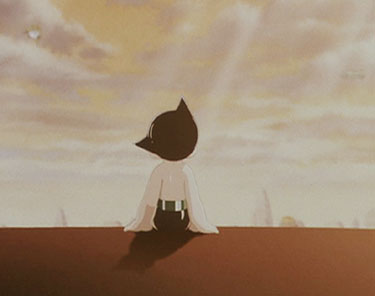
After traveling to the Arctic to help recover a lost explorer robot, Astro becomes further entangled in the oncoming war between humans and robots in the second episode of the fifth and final DVD volume. The Blue Knight and his band of angry battle robots rescues slave bots from Drake's band of antirobites. When Drake's group pays the Blue Knight's base a visit, Tenma fans the flames of war by putting Astro in the middle of the conflict. Astro may be forced to choose sides, human or robot, and he may have to fight both by the time this day's over.
When a human-like police robot goes rogue, Astro is called on to find him before he's destroyed in episode 43. Working with the ARRS, our long-lost robot police force, Astro learns this robot is avoiding a massive reprogramming, which would take away his love for music, books and other human frivolities. He doesn't want to be human, really, he just "wants to be me." Can the ARRS leader go against his orders and programming to help one of his kind? Or does he side with the humans, who want to eliminate robot emotions? What do you think? The lines in the sand are being drawn very quickly now.
Next, Astro and friends visit the kingdom of the princess we saw last in episode 28, to celebrate the anniversary of the arrival of robots to the kingdom. But the robots have stopped speaking with the humans in this land, and are obviously plotting something. And it must have something to do with that strange dragon creature flying overhead at night. And … cue rescue by Astro! This will be the final side story we get before the war between robots and mankind officially begins.
As with many robot revolutions, the one in Astro Boy begins with the fate of one robot. A servant robot named Jake is accused of harming a young girl, the daughter of a general. Arrested and put on trial ("fair and objective," of course), Jake is found guilty and him and all his kind are ordered to be destroyed. Drake instills fear among all owners of these robots, calling them deadly weapons, and has his group commit crimes against humans, in the guise of robots. Now no machine is safe, not even the police robots. Big mistake.
The Blue Knight and his army, hearing the news, come to the defense of the robots being hunted in the streets. "How many robots must be destroyed before you realize the humans must be defeated?" the Knight yells at Astro as our hero once again tries to keep both sides from harm. The Knight attempts to save Jake and his kind, attacks the police, and announces that "the revolution has begun." In turn, the city announces that all robots are to be considered armed and dangerous.
The Knight, with his army and the rescued bots, founds a new, independent nation of robots in the Arctic, calling it Robotonia. When the general orders the destruction of all AI robots – including Astro – our hero must flee to the new country. The general is put in charge of all of mankind's armies, Dr. O'Shay is put under arrest, and Astro is now a feared robot, not the defender of humanity that people saw him as before. The humans go off in search of the new nation, while Tenma sits back and watches his end-game plot unfold.
Back at Metro City, the young girl who's the excuse behind this war against robots has come out of her coma, and tries to tell anyone who'll listen that she was not hurt by the robots, that her injury was an accident. But things have gone beyond any point of turning back.
Atlas, Pluto and several other well-known robots come along to join the war in episode 47. Battle becomes heavy and constant, as the humans attempt to use a giant laser cannon while the robots take care of most everything the humans send at them. Zoran and the leader of the robot police force are put with other captured robots, and are slated for destruction when the human police chief, of all people, comes along with a court order to have them released. And Astro is told by Tenma that a new, more powerful body is ready for him, and says he is ready to assume his mantle as leader of the robots. Is he?
In episode 48, Tenma reveals more details of his plan, but his invention Shadow may get in the way. Astro is close to negotiating a truce, after the injured girl is able to tell her father the general the truth. But the general is skeptical.
Also during this episode, Astro delivers a long, televised speech, with characters we've long since forgotten about shown watching. Astro's speech moves humans and robots alike to stop fighting. Except Drake. He launches a giant rocket at the fleeing Knight's ship, and Astro Boy gets in the way, taking the rocket high in the sky … where it explodes. Of the five back-to-back cliffhangers at the end of this series, this one's the best.
Tenma comes along with an offer that can't be refused: hand over Astro to be reborn again, or Astro will never awake again. Tenma is able to repair Astro, but erases all of the boy's memories, and, coming full circle, calls him Tovio. Tenma takes Tovio fishing, plays with him, and babies him. It's like he has his son back. Zoran may be able to bring our Astro back, but only if Drake doesn't get in the way one last time.
In the final episode of this series, we see Tenma, his war between robots and humans all but dissolved, launch one final attack on O'Shay's Ministry of Science. Is Astro able to save the day one last time? Or will our bad guy have the last laugh? The answers lie in both the past and the present.
|
| Popular Reviews |
| Sponsored Links |
|
|
| Sponsored Links |
|
|
| Release List | Reviews | Shop | Newsletter | Forum | DVD Giveaways | Blu-Ray | Advertise |
|
Copyright 2024 DVDTalk.com All Rights Reserved. Legal Info, Privacy Policy, Terms of Use,
Manage Preferences,
Your Privacy Choices | |||||||









